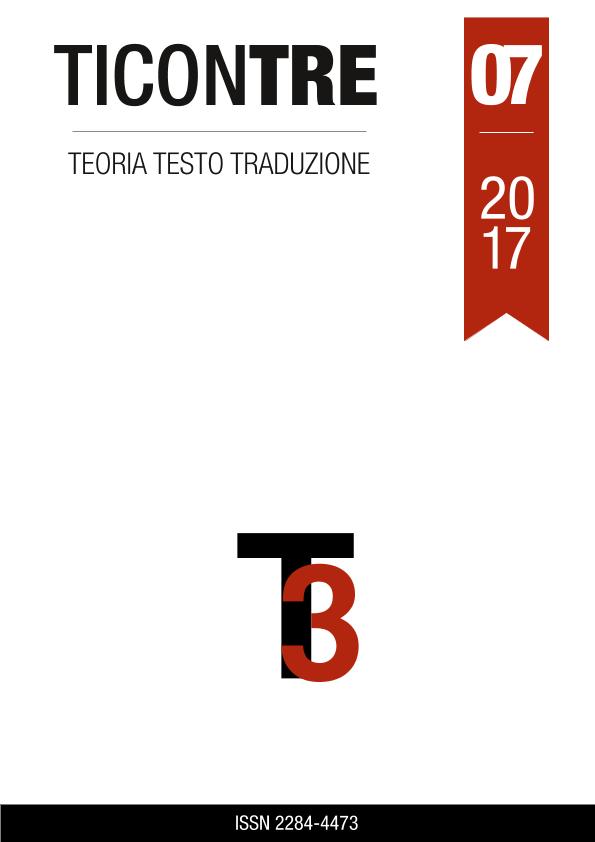Mostrar el registro sencillo del ítem
dc.contributor.author
Stocco, Melisa Soledad

dc.date.available
2019-02-11T17:00:24Z
dc.date.issued
2017-05
dc.identifier.citation
Stocco, Melisa Soledad; Negociación lingüística e identitaria en las autotraducciones de tres poetas mapuche; Università degli studi di Trento; Ticontre; 7; 5-2017; 41-65
dc.identifier.issn
2284-4473
dc.identifier.uri
http://hdl.handle.net/11336/69843
dc.description.abstract
El presente trabajo busca indagar en el telos de la autotraducción de autores y autoras de pueblos originarios de América Latina que producen una literatura bilingüe lengua vernácula-castellano y en la conformación de los relatos de identidad y de memoria entre lenguas y culturas. El análisis se centrará en la producción de un grupo de tres poetas mapuche contemporáneas: Liliana Ancalao, Jaqueline Caniguán y Adriana Pinda. Se reflexionará acerca de la figura de «desplazada» de la lengua y el territorio ancestrales, señalando los matices de significación que presentan tensiones y complementariedades entre las versiones bilingües de una serie de poemas. Se analizará cómo desde la singularidad de sus voces, su situación sociolingüística, y determinadas estrategias de autotraducción, cada autora negocia su propia identidad como mujer mapuche en el mundo contemporáneo, entre el campo y la ciudad, el mapudungun y el castellano, y cómo se vincula a una voz colectiva que se agencia en la denuncia social y la revitalización lingüística y cultural del mundo mapuche.
dc.description.abstract
This work seeks to inquire into the telos of selftranslation in authors belonging to First Nations of Latin America, who produce a bilingual literature in their vernacular language and Spanish, and to look into the conformation of narrations of identity and memory between languages and cultures. The analysis will focus on the production of a group of three contemporary Mapuche poets: Liliana Ancalao, Jaqueline Caniguan and Adriana Pinda. The ୰gure of «the displaced» in relation to the ancestral language and territory will be studied, signalling the semantic nuances that evince tensions and complementarity between the bilingual versions of a group of poems. Given the singularity of each voice, their sociolinguistic situation and certain self-translation strategies, the analysis will seek to establish how each author negotiates her identity as a Mapuche woman in the contemporary world, between the country and the city, Mapudungun and Spanish, and how she relates to a colective voice that deals with social denunciation and the linguistic and cultural revitalization of the Mapuche world.
dc.format
application/pdf
dc.language.iso
spa
dc.publisher
Università degli studi di Trento
dc.rights
info:eu-repo/semantics/openAccess
dc.rights.uri
https://creativecommons.org/licenses/by-nc-sa/2.5/ar/
dc.subject
Autotraducción
dc.subject
Bilingüismo Post-Interdicto
dc.subject
Poesía Mapuche
dc.subject
Memoria
dc.subject.classification
Estudios Generales del Lenguaje

dc.subject.classification
Lengua y Literatura

dc.subject.classification
HUMANIDADES

dc.title
Negociación lingüística e identitaria en las autotraducciones de tres poetas mapuche
dc.type
info:eu-repo/semantics/article
dc.type
info:ar-repo/semantics/artículo
dc.type
info:eu-repo/semantics/publishedVersion
dc.date.updated
2018-12-19T14:41:01Z
dc.journal.number
7
dc.journal.pagination
41-65
dc.journal.pais
Italia

dc.journal.ciudad
Trento
dc.description.fil
Fil: Stocco, Melisa Soledad. Universidad Nacional de Cuyo. Facultad de Filosofía y Letras. Departamento de Letras. Centro de Literatura Comparada; Argentina. Consejo Nacional de Investigaciones Científicas y Técnicas. Centro Científico Tecnológico Conicet - Mendoza; Argentina
dc.journal.title
Ticontre
dc.relation.alternativeid
info:eu-repo/semantics/altIdentifier/url/http://www.ticontre.org/ojs/index.php/t3/article/view/157
Archivos asociados
